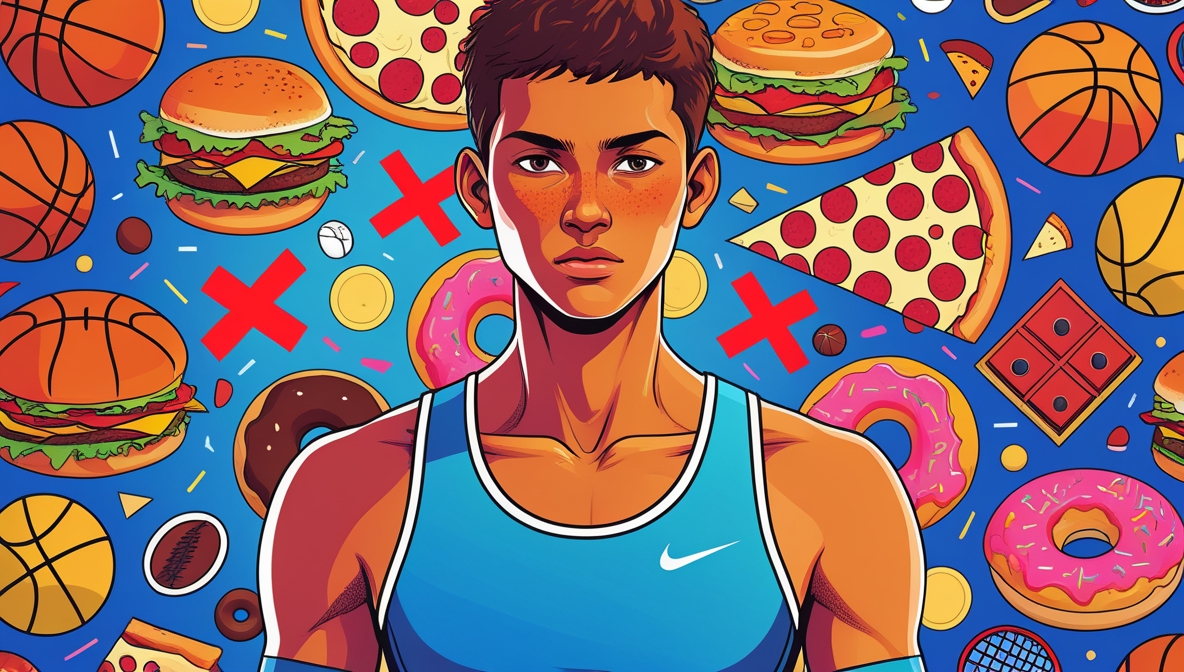Athletes need to fuel their bodies efficiently, yet some foods hinder rather than help performance. To maintain energy, optimize recovery, and achieve goals, certain foods should be avoided or consumed sparingly. Below is a comprehensive guide to foods athletes should steer clear of and the reasons they can be detrimental.
Sugary Foods and Drinks
High-sugar items like candy, pastries, and sodas provide a quick energy boost but lead to an inevitable energy crash. These spikes in blood sugar can negatively affect endurance and performance, making it important to structure an athlete meal plan with balanced, slow-digesting carbohydrates. Over time, excessive sugar consumption can contribute to weight gain, insulin resistance, and increased risk of inflammation.
Examples to Avoid:
- Energy drinks loaded with sugar
- Sugary cereals
- Store-bought baked goods
Better Alternatives: Whole fruit, natural smoothies, or homemade energy bars with minimal added sugars.
Fried and Greasy Foods
Fried foods are heavy, difficult to digest, and often lead to sluggishness. They are high in unhealthy trans fats and refined oils, which can impair heart health and lead to inflammation.
Examples to Avoid:
- French fries
- Fried chicken
- Chips and similar snacks
Better Alternatives: Oven-baked options or snacks prepared with healthier oils like olive or avocado oil.
Processed Meats
Processed meats like sausages, hot dogs, and deli meats contain high levels of sodium, preservatives, and saturated fats. These can lead to dehydration, reduced cardiovascular efficiency, and increased risk of long-term health issues.
Examples to Avoid:
- Pepperoni
- Bacon
- Pre-packaged lunch meats
Better Alternatives: Grilled chicken, turkey breast, or plant-based protein sources.
Artificial Sweeteners
While marketed as a healthier alternative to sugar, artificial sweeteners can disrupt gut microbiota, leading to digestive issues and poor nutrient absorption. They may also trigger sugar cravings, resulting in poor dietary choices.
Examples to Avoid:
- Diet sodas
- Sugar-free desserts
- Low-calorie syrups
Better Alternatives: Honey, maple syrup, or stevia in moderation.
Alcohol
Alcohol dehydrates the body, reduces muscle recovery, and impairs coordination and cognitive functions. Regular consumption can also negatively affect sleep quality, which is vital for athletic recovery.
Examples to Avoid:
- Beer
- Cocktails
- Spirits
Better Alternatives: Non-alcoholic beverages like kombucha or electrolyte-rich drinks.
Highly Refined Carbohydrates
Refined carbs, such as white bread and pastries, lack the fiber and nutrients needed for sustained energy. They are digested quickly, leading to spikes and crashes in energy levels.
Examples to Avoid:
- White bread
- Pasta made from refined flour
- Instant noodles
Better Alternatives: Whole-grain bread, quinoa, or brown rice.
High-Sodium Foods
Excess sodium causes water retention and increases the risk of dehydration, particularly during intense training sessions or competitions.
Examples to Avoid:
- Canned soups
- Packaged sauces
- Fast food
Better Alternatives: Homemade soups and meals seasoned with herbs and spices instead of salt.
Dairy Before Exercise
Dairy products can cause bloating, cramping, and discomfort during workouts, especially for those who are lactose intolerant. Milk and cheese also take longer to digest, potentially leading to sluggishness.
Examples to Avoid Before Workouts:
- Milkshakes
- Creamy cheeses
- Full-fat yogurts
Better Alternatives: Plant-based yogurts or small amounts of almond or oat milk.
High-Fat Foods
Foods rich in saturated fats slow digestion and reduce blood flow to the muscles, which can impede performance and recovery.
Examples to Avoid:
- Butter-heavy dishes
- Ice cream
- Fatty cuts of meat
Better Alternatives: Avocado, nuts, and seeds for healthier fats.
Carbonated Beverages
Carbonated drinks cause bloating and discomfort, especially when consumed close to physical activity. They also lack the hydration benefits of plain water or electrolyte drinks.
Examples to Avoid:
- Soda
- Sparkling water with added sugars
- Flavored carbonated drinks
Better Alternatives: Infused water or herbal teas.
Energy Bars with Hidden Additives
Not all energy bars are created equal. Many are packed with sugar, artificial ingredients, and unnecessary calories, providing more harm than good.
Examples to Avoid:
- Bars with over 15g of sugar
- Products with artificial additives or preservatives
Better Alternatives: Homemade bars made with oats, dried fruits, and nuts.
Spicy Foods
Spicy foods can irritate the stomach lining, leading to discomfort, heartburn, or indigestion during workouts or competitions.
Examples to Avoid:
- Spicy curries
- Hot sauces in large quantities
- Jalapeño-laden dishes
Better Alternatives: Mildly seasoned meals that are easier to digest.
Low-Calorie Diet Foods
Foods marketed as low-calorie often lack essential nutrients athletes need for energy and recovery. They may also contain artificial fillers or sweeteners.
Examples to Avoid:
- Low-calorie frozen meals
- Diet snacks
- Fat-free but highly processed items
Better Alternatives: Balanced, nutrient-dense meals with whole ingredients.
Excessive Caffeine
While caffeine in moderation can enhance performance, excessive consumption leads to dehydration, increased heart rate, and disrupted sleep.
Examples to Avoid:
- Energy shots
- Overly strong coffee
- Caffeinated sodas
Better Alternatives: Green tea or small amounts of coffee earlier in the day.
Pre-Packaged Smoothies
Store-bought smoothies often contain hidden sugars and lack the nutrient balance required for recovery or energy.
Examples to Avoid:
- Bottled fruit smoothies with added sugar
- Pre-blended meal replacements
Better Alternatives: Homemade smoothies with fresh fruits, vegetables, and a protein source.
Final Thoughts
Athletes must be mindful of what they consume to achieve peak performance. Avoiding the above foods and focusing on whole, nutrient-dense options will support energy, recovery, and overall health. Always prioritize balanced meals tailored to your specific training and recovery needs.
